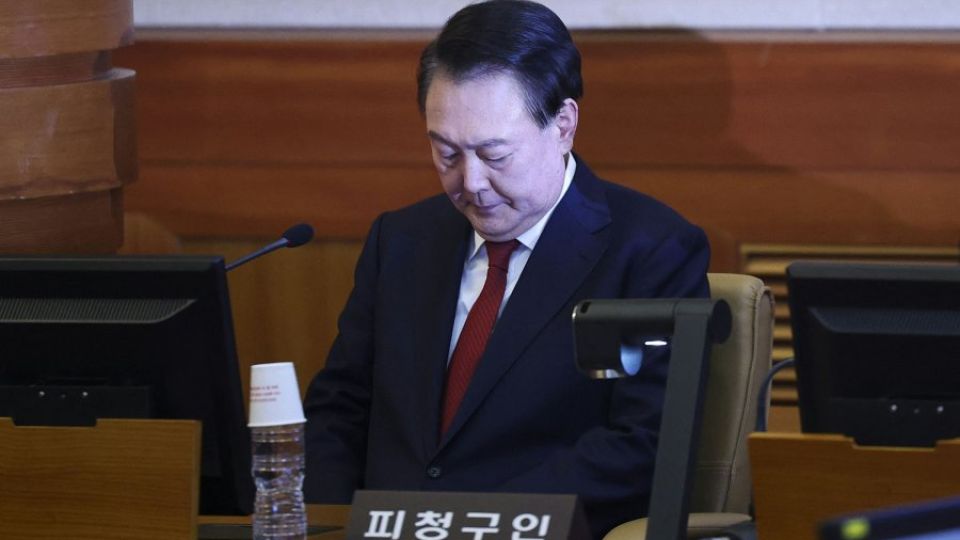January 22, 2025
SEOUL – President Yoon Suk Yeol appeared before the Constitutional Court of Korea on Tuesday for his impeachment trial and denied that he had ordered to drag out lawmakers from the parliament on the night he declared martial law on Dec. 3.
Defending himself against a National Assembly-approved bill seeking his removal over his martial law declaration, Yoon refuted the opponent’s claim that he intended to obstruct the parliament’s vote to lift the law.
“If it is claimed that the martial law had obstructed the parliament by deploying the military, does that mean martial law will continue indefinitely? I don’t think so,” he said after watching the surveillance camera footages submitted as evidence from the National Assembly which showed troops using force to enter the Assembly building.
“In South Korea, the National Assembly and the media hold more authority than the president. Even if I were to try to block the resolution to lift martial law, it could still be carried out in a venue other than the National Assembly,” Yoon told the justice.
He added that “if someone were to try to block (passing the resolution to lift the martial law), it would be an action that cannot be possibly managed afterwards.”
When the court’s acting chief Moon Hyung-bae asked Yoon if he had given a memo to then-Finance Minister Choi Sang-mok to set aside a budget for the operation of the emergency legislature, Yoon said no.
“I only knew (about the memo) long after I lifted the martial law declaration and read about it on the news, which was very inaccurate. The only one who would draft (such a memo) would be the Defense Minister, but since he had been arrested, I could not check with him. The details (in the memo) itself are pretty contradictory, too,” Yoon told the justice.
Yoon is the first sitting president in the country’s history to become a criminal suspect. He entered the courtroom at 2 p.m. in a navy suit, a shirt and a red tie, instead of the prison attire he has to wear in his 10-square-meter solitary cell at Seoul Detention Center.
When the court’s acting chief Moon asked if Yoon had any words before starting the session, Yoon shortly said that he felt “sorry to the justices” to have caused concern.
“Throughout my public service career, I have firmly upheld the belief in liberal democracy. As the Constitutional Court exists to safeguard the Constitution, I kindly ask our justices to carefully examine all aspects of this case,” Yoon told justices.
Tuesday’s hearing, the third of Yoon’s impeachment trial, was the first Yoon attended.
Neither former presidents Roh Moo-hyun nor Park Geun-hye, who faced impeachment trials in 2004 and 2017, respectively, appeared in person before the Constitutional Court.
During the trial, Yoon and his lawyers sought to justify the martial law declaration as necessary to address suspicions about the credibility of the election system.
Yoon denied this was a conspiracy theory.
“The person who knows the best about the case is the president, myself. The National Assembly has been calling the election fraud a conspiracy and such an allegation is a logic created afterward to justify the martial law declaration.
“But before the martial law was declared, there were already doubts about the fairness of elections. (So sending troops to the National Election Commission on Dec. 3) was not to uncover election fraud itself, but we wanted to see if we could check what system was being operated, after we found many errors after checking the computerized equipment at the National Intelligence Service in October 2023. So it was not to raise conspiracy theories that the NEC was fraudulent and untrustworthy, but to verify the facts,” Yoon told justices.
During the trial, Yoon’s lawyers showed pictures of irregular ballots with stamp seals crushed or stiff papers as evidence of election fraud.
Yoon’s team also focused on explaining how the declaration of martial law was “merely a formal procedure without any intention of enforcement.”
“The purpose was to appeal to the people, warn them against an unprecedented and unparalleled legislative overreach, and prevent actions detrimental to national interests in diplomacy and security. It was aimed at stopping the collapse of the liberal democratic order,” Yoon’s lawyer Cha Ki-hwan told justices.
“It was not enforceable, and there were no plans to implement it. The necessary execution mechanisms were not included. Consequently, Proclamation No. 1 was drafted by Defense Minister Kim Yong-hyun, referencing precedents for martial law, solely to fulfill the formalities,” he said, sitting next to Yoon in the courtroom.
Ahead of Yoon’s appearance at the Constitutional Court, police tightened security in the area. According to police, 64 units comprising 4,000 police officers were deployed, and vehicle barricades were set up around the block where the court is located.
Earlier in the day, the court said details about Yoon’s security and his entry process to the courtroom were “confidential,” based on the agreement with the presidential security team.
But based on precedents, it was expected that Yoon would be transported from the Seoul Detention Center to the Constitutional Court in a Ministry of Justice vehicle and enter the courtroom through an alternate route.
As Yoon continues to assert the legitimacy of the martial law declaration and criticize the opposition-led impeachment, the case has heightened tensions among his staunch supporters.
Following the detention warrant issued Sunday, Yoon’s supporters staged a violent raid on the Seoul Western District Court on the same day, which led to increased calls for reinforced security at the Constitutional Court.
The court, with eight justices in a nine-member bench, is tasked with either upholding or overturning Yoon’s impeachment by June 11. The justices already announced a plan to hold eight hearings on Yoon’s trial by Feb. 13.


